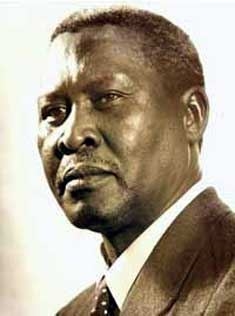 |
| (http://www.southafrica.info/about/history/albert-luthuli.htm) |
It could be argued the greatest heroes are not those who are there at the end of injustice, but those who pave the road to justice but do not live to see the fruits of their labor. Albert Luthuli was one such man.
Albert John Mvumbi Luthuli was born sometime in 1898 near Bulawayo, Southern Rhodesia (now Zimbabwe), the son of a Seventh Day Adventist missionary. In 1908 He was sent to Groutville, Natal, which was his ancestral home where he went to the mission school. Luthuli trained as a teacher at Edendale, near Pietermaritzburg. At around this time he was confirmed as a Methodist minister and began preaching. This experience would profoundly affect his fight against Apartheid. Luthuli attended additional courses at Adam’s College, he went on to become one of the college staff where he remained until 1935. In 1935 Luthuli accepted the chieftaincy of the Groutville reserve and was suddenly immersed in South Africa’s racial politics. That year also saw the introduction of the ‘Development Trust and Land Act’ which limited Black African land holding to an area of native reserves.
Luthuli's fight against Apartheid began because of his hope as a teacher for equal education for all races. Luthuli generally fought against Apartheid in a non-violent way. For his non-violent protests he was given the “choice” to either renounce his membership in the ANC or give up his position as tribal chief. He refused this offer and was immediately dismissed from his position as chief. Later on when Nelson Mandela became provincial President the government responded by banning Luthuli, Mandela, and over a hundred others. There were many other punishments the government tried to use to try to take the will of so many of these leaders. After 72 Africans were shot and some two hundred more were injured while protesting, Luthuli responded by publicly burning his passbook; he was one of the first to do this. In 1960 he received the Nobel Peace Prize for his effort to end Apartheid.
While Luthuli wasn't a pacifist, he never condoned violent methods while he was in the ANC as he felt the ANC's principles to exclude violence. Luthuli was a vehement anti-colonialist and anti-imperialist and felt that Apartheid did harm to everyone in South Africa, but he did not have any desire to exclude anyone from the process of ending Apartheid, or from post-Apartheid South Africa on basis of race. Nor did he desire to exclude any ideological persuasion, despite being criticized as allowing the Communist party to have too much influence in the ANC. He constantly held out hope that whites would eventually realize what a horror Apartheid was and that it could not last long. Due to this belief and his faith he refused to repay hate with hate and instead did everything to seek reconciliation between white and black in South Africa.
"Albert Lutuli Biography." NobelPrize.org. Nobel Foundation, nd. Web. 3 Mar. 2010.
Reddy, E S. "The Lutuli Page." anc.org. African National Congress, nd. Web. 3 Mar. 2010.
"The Legacy of Albert Lutuli." SouthAfrica.info. African National Congress, 21 Sep. 2004. Web. 3 Mar. 2010.
Page created on 3/4/2010 12:00:00 AM
Last edited 3/4/2010 12:00:00 AM
